Is New York City’s Viral “Allergen-Free” Bakery Too Good to Be True?
What you should know before trying their pastries
A few weeks ago, Bub’s Bakery, a new “allergen-free” bakery in New York City, started popping up all over my Instagram feed ahead of opening.
Multiple content creators and publications posted glowing reviews hyping up this business. A handful of friends shared reels with me, and I drooled over the decadent-looking gluten-free cinnamon rolls.
Then, last week, I noticed discussion online about the bakery’s ingredient transparency and decided to dig a little deeper. Here’s what I learned—and what you should know before visiting.
Table of contents:
What does “allergen-free” even mean?
The problem with an “allergen-free” label
How the bakery responded to customer feedback
My Q&A with the bakery co-founder
My take as a celiac (and a marketer)
What does “allergen-free” even mean?
According to Bub’s website, it’s an “allergen-free bakery.” What does that mean?
In a post on Threads last week, Allie Bahn, a food allergy travel expert, says, “there is no such thing as ‘allergen-free.’” Bub’s Instagram bio specifies the baked goods are “top 9 allergen-free.”
ICYMI, in the United States, the Food and Drug Administration requires packaged products to label the top 9 foods that cause allergies. These are milk, eggs, fish, shellfish, tree nuts, peanuts, wheat, soybeans, and sesame.
Bahn explains that people can be allergic to 100+ foods—well beyond the top 9 allergens required to be labeled on packaging in the US. In fact, as Bahn notes, in other countries, there are anywhere from 14 to 24 major allergens that must be listed on packaging.
Some content creators even called Bub’s “New York City’s first allergen-free bakery.” But it’s worth noting that Erin McKenna has long catered to the food allergy community and opened her first bakery here 20 years ago, in 2005 (anyone remember Babycakes?!).
While she no longer has a brick and mortar store in New York City, Erin still has a couple of other locations and ships her gluten-free, dairy-free, egg-free, nut-free, and soy-free baked goods nationwide.
The problem with an “allergen-free” label
Most celiac and food allergy customers are savvy about their health and know to ask questions before ordering food. But around the bakery’s opening, some customers mentioned in online reviews that staff weren’t always able to provide detailed ingredient information when asked.
Here’s a sampling of the Google reviews:
What’s more, while the baked goods may be free of the top 9 allergens, that doesn’t mean there aren’t food allergens present in the establishment altogether.
Despite calling itself an “allergen-free” bakery, Bub’s offers whole milk for coffee drinks. Some online commenters (like the one below) have pointed out that this seems inconsistent with the “top 9 allergen-free” label.
Food allergy advocates also warn that a blanket claim like “allergen-free” could give some customers a false sense of security—particularly those who don’t have food allergies themselves but are buying products for others who do.
“By using allergen-free, I have already seen reviews that parents who do not have kids with food allergies think this food is safe for all kids with food allergies,” shares Bahn in her Threads post. “This is dangerous and inaccurate.”
How the bakery responded to customer feedback
A few of my friends in the celiac community have reached out to the bakery privately and publicly to ask about ingredients. For celiac customers, the biggest question was whether the bakery’s items contain oats—and if so, whether the oats were certified gluten-free.
Some celiacs I’ve spoken to said they were frustrated by the bakery’s initial response—that the oats were gluten-free, without clarifying whether they were certified or sharing which oat flour brand they used.
The bakery did begin answering ingredient questions in more detail on Instagram last week. Here’s a look at some of the responses:
Bub’s has also since added ingredient cards to the pastry cases. Here’s a photo an Instagram user posted on October 1:
My Q&A with the bakery co-founder
I reached out to Bub’s PR team last week to let them know I’d be publishing a piece addressing the online discussion around the bakery.
I requested an interview and emailed over a few questions about how the bakery plans to support the gluten-free and food allergy communities moving forward.
Jenn Saesue, co-founder of 55 Hospitality and Bub’s Bakery, took the time to respond to my questions below.
Q: What are your goals for Bub’s Bakery, and how do you hope the business supports the celiac + food allergy communities?
A: “At Bub’s, our goal is really simple: we want everyone to feel like they can enjoy a bakery treat without worry. Food should be about joy and connection, not stress. By keeping everything top 9 allergens free we’re making sure people with celiac disease and allergies don’t feel left out. The dream is to create a space where friends and families can come together, and nobody has to sit on the sidelines.”
Q: Can you share how staff are trained on ingredients/allergens, and whether you have plans to expand training based on community feedback?
A: “We spend a lot of time talking with our staff about not just what ingredients we use, but why we use them. That way, they can answer questions clearly and confidently. We’ve put together ingredient guides and simple systems to make sure everyone’s on the same page. And now that our physical store has opened, we’re building on that by adding new training based on the real questions and feedback we hear from our guests.”
Q: How do you hope to gain the trust of customers with celiac disease and food allergies after receiving feedback from members of the community?
A: “For us, trust comes down to being open and consistent. We try to be as transparent as possible by answering ingredient questions right on Instagram or directly when people reach out. When someone gives us feedback, we take it seriously, we respond, we adjust, and we make sure people know we’re listening. Over time, we hope those small actions show that we’re here to do this right.”
Q: Is there anything else you’d like to share on this topic?
A: “Bub’s started from the idea that everyone deserves to treat themselves without hesitation. We’re really thankful to the people who’ve shared their experiences with us so far, it’s shaped the way we think and how we move forward. We want Bub’s to feel like a place where you don’t have to second guess whether it’s safe you can just enjoy.”
My take as a celiac (and a marketer)
In my opinion, Bub’s should’ve put more consideration into its marketing strategy before opening. Customers with celiac disease and food allergies understandably get frustrated when a business doesn’t seem to take their needs seriously. This is for good reason—for food allergies specifically, anaphylaxis is severe and potentially life-threatening.
While I don’t know who was involved in the branding and marketing leading up to the launch, this is exactly the kind of situation where working with someone familiar with the nuances of celiac disease and food allergies could make a big difference.
One thing I would’ve recommended from the beginning? Make ingredient lists easily accessible—and not just the basic ingredients. For example, celiac customers need to know what kind of oats are used in baked goods since not all oats are celiac-safe.
Plus, as Bahn notes in her Threads post, “People with food allergies need to know the ingredients in the butter/oil you used, if the manufacturing for ingredients says ‘may contain’ or any other warnings, etc.” .
Going forward, Bahn suggests Bub’s brand themselves as “allergen-friendly” instead of “allergen-free.” I don’t love the phrase allergen-friendly, but something like this better gets the message across that the bakery is “aware of allergies but not free of them,” writes Bahn.
Finally, Bahn recommends changing the names of some of the pastries that normally make people with certain food allergies nervous to try them.
Case in point: As seen below from an Instagram reel from September 23, there was a “PB&J” pastry on the menu at launch. This kind of naming confusion (given the bakery is nut-free) can make it harder for food allergy customers to feel confident ordering.
This situation also reinforces my general skepticism about anything I see on social media. I don’t always trust businesses promoted by content creators, even if the creators have celiac disease or are gluten-free. You just can’t tell how careful someone is, or how much research they’ve done, from Instagram or TikTok.
That said, I’m certainly glad Bub’s is starting to address customer feedback and is actively taking steps to ensure those with celiac disease and food allergies can feel safe ordering from them.
The bottom line: I’ll continue to do my own research and vet new gluten-free establishments such as Bub’s Bakery before trying them (and I suggest you do the same!).
As a celiac, I’m lucky there are many dedicated gluten-free bakeries for me to choose from in New York City, so I can be selective about where I spend my money and what businesses I support.
Have you visited Bub’s or seen the buzz? I’d love to hear about your experience below. Your comments help the community stay informed!




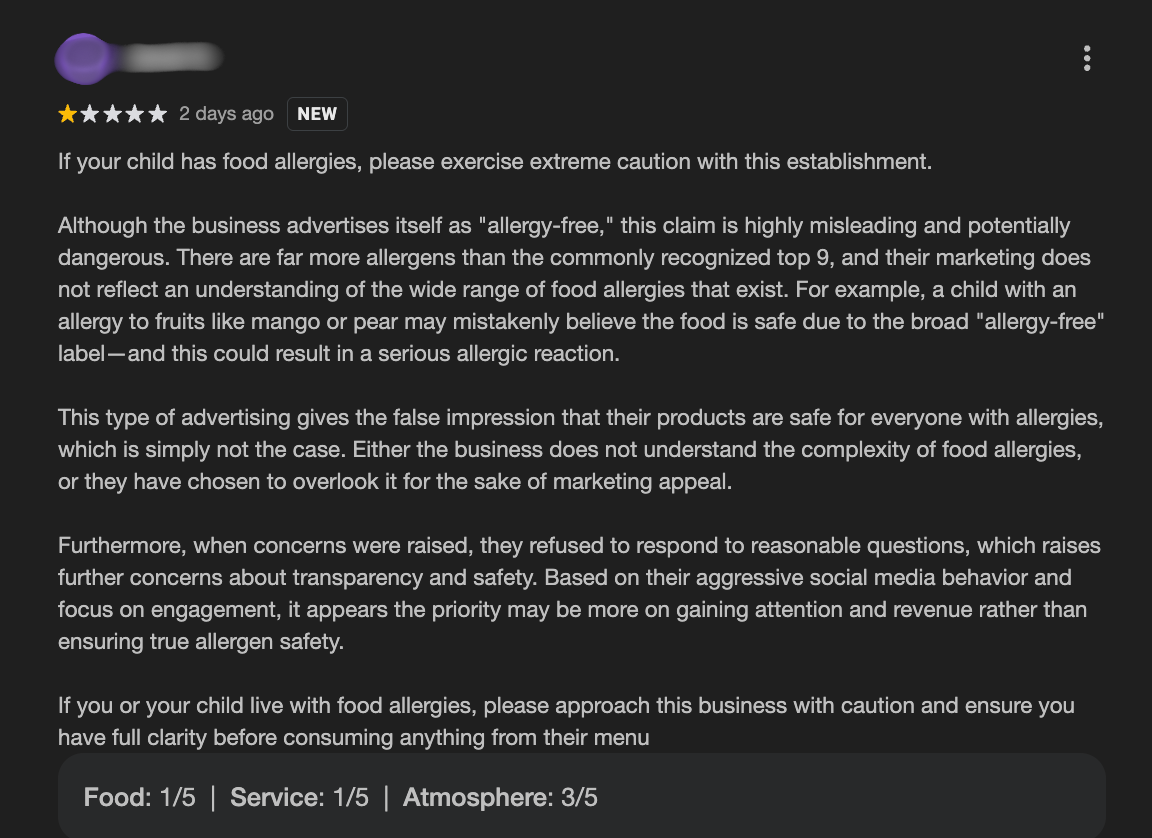
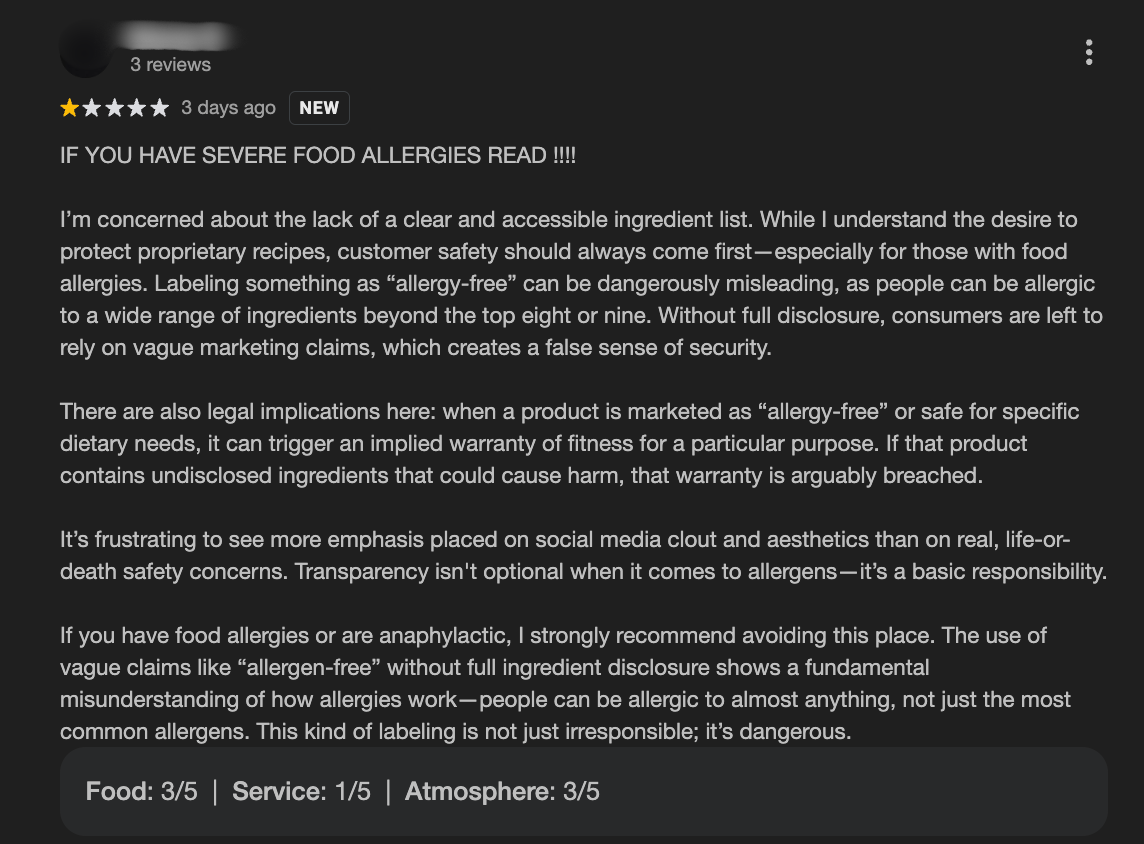
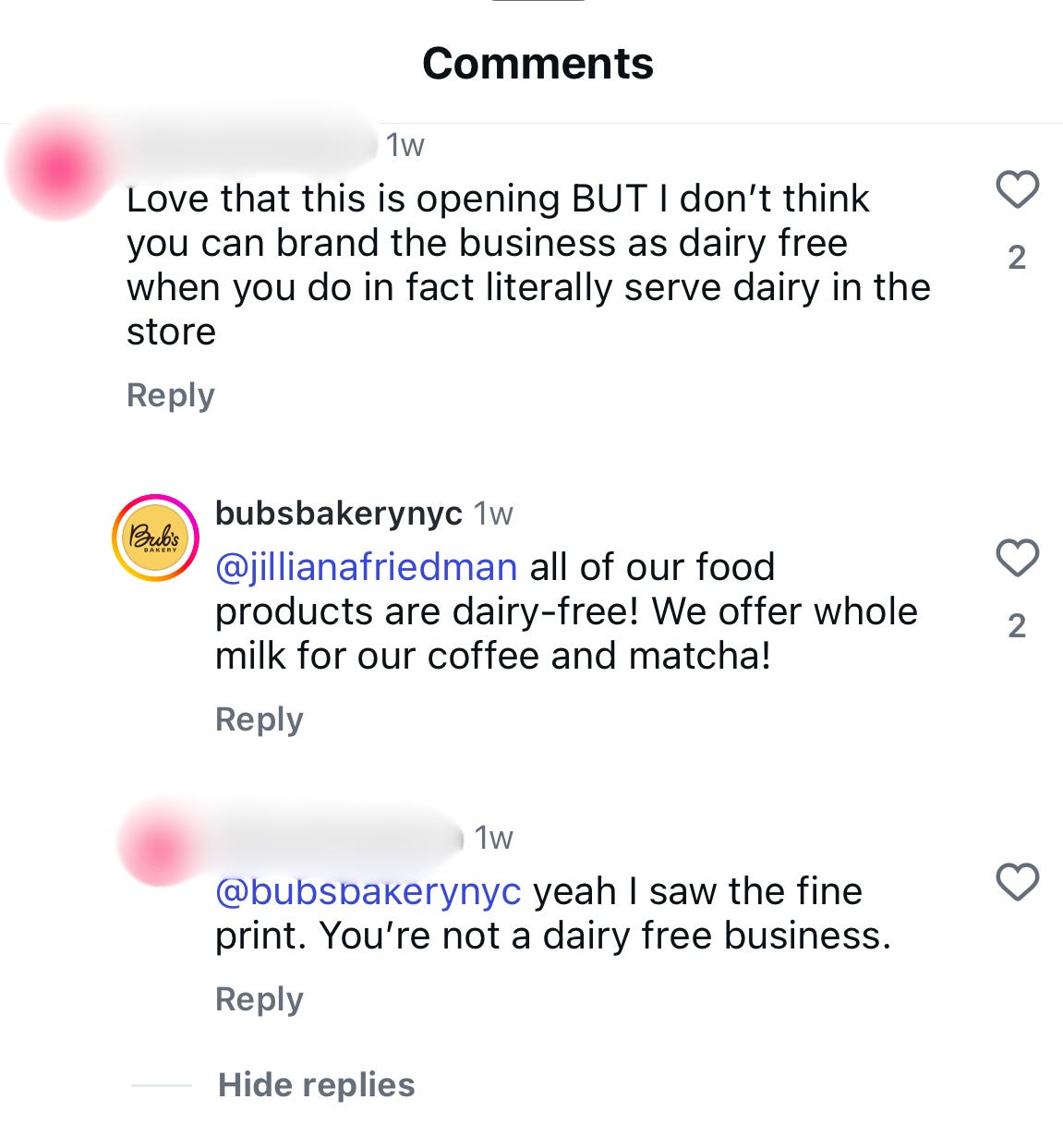
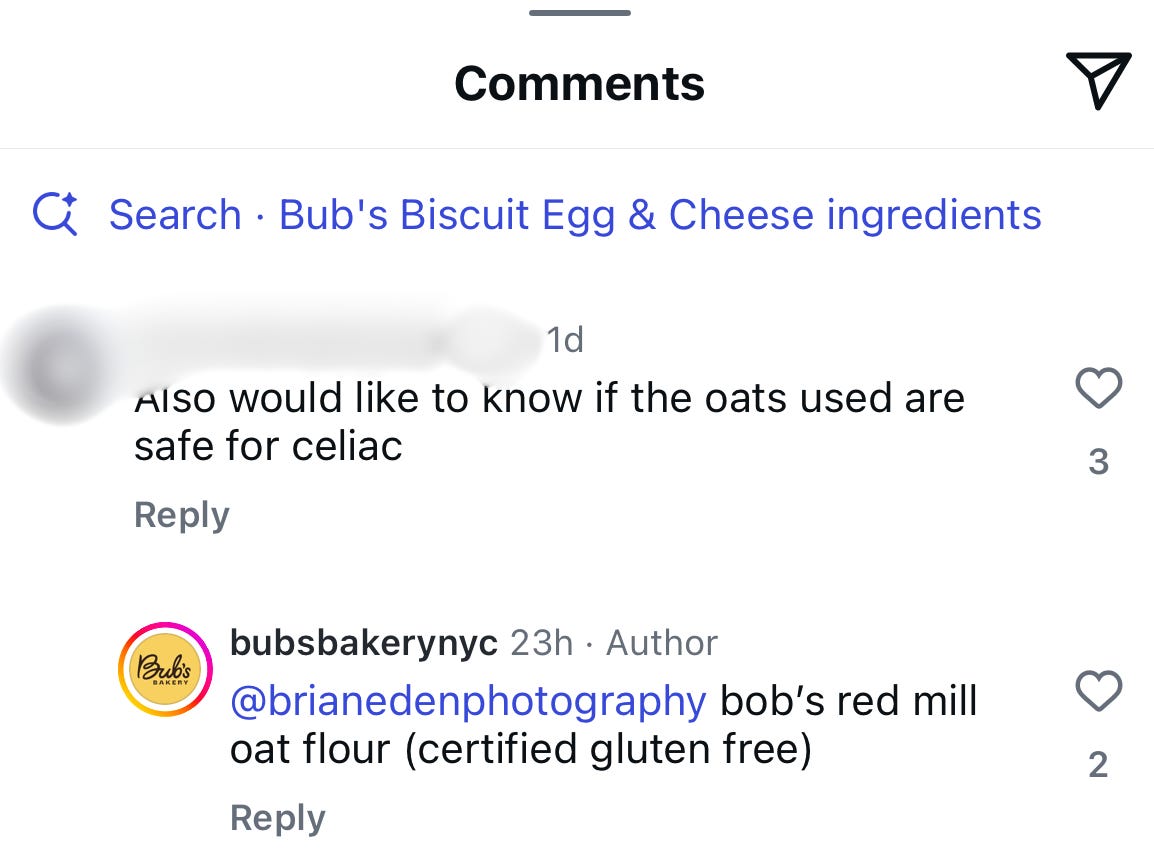
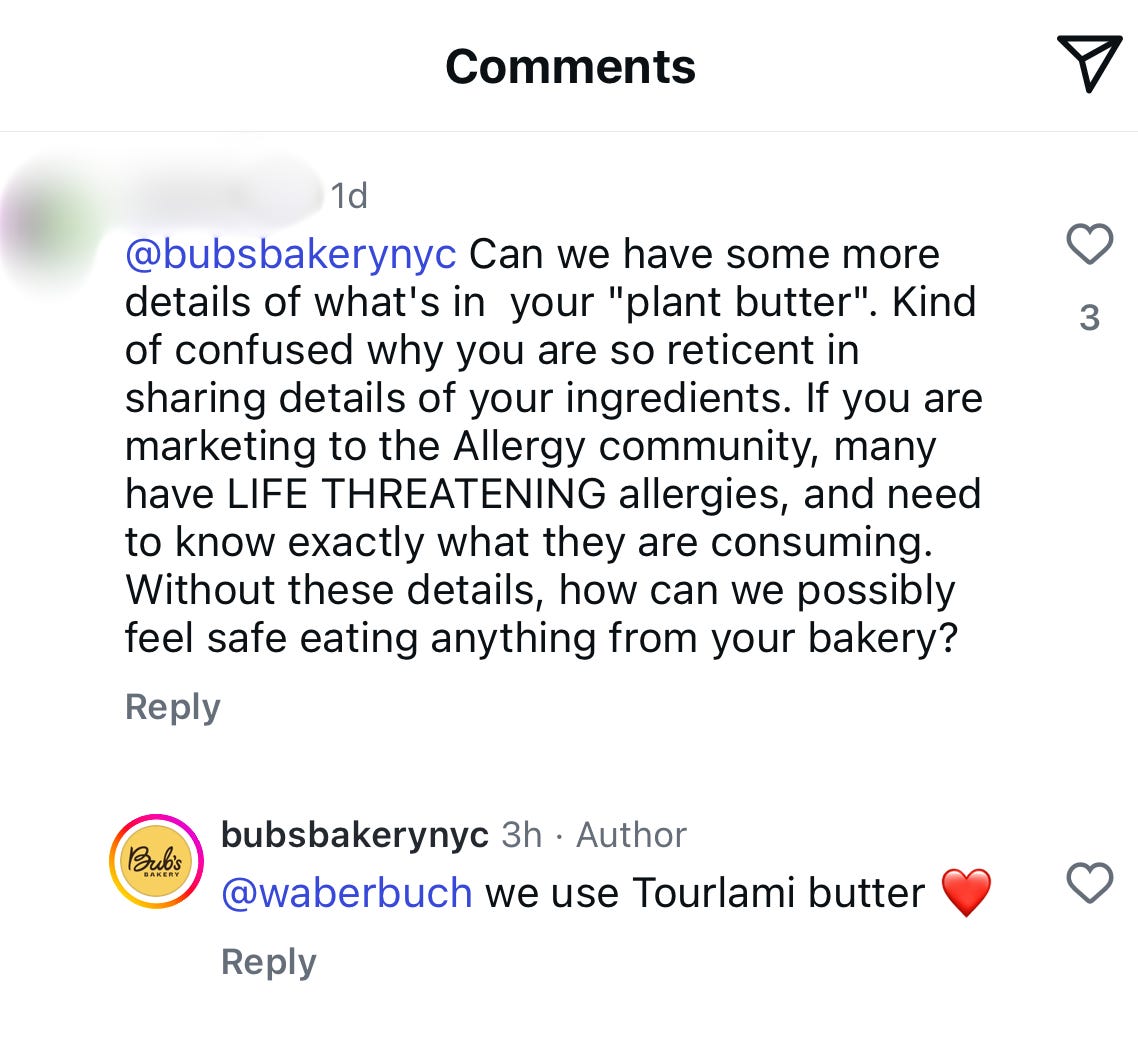
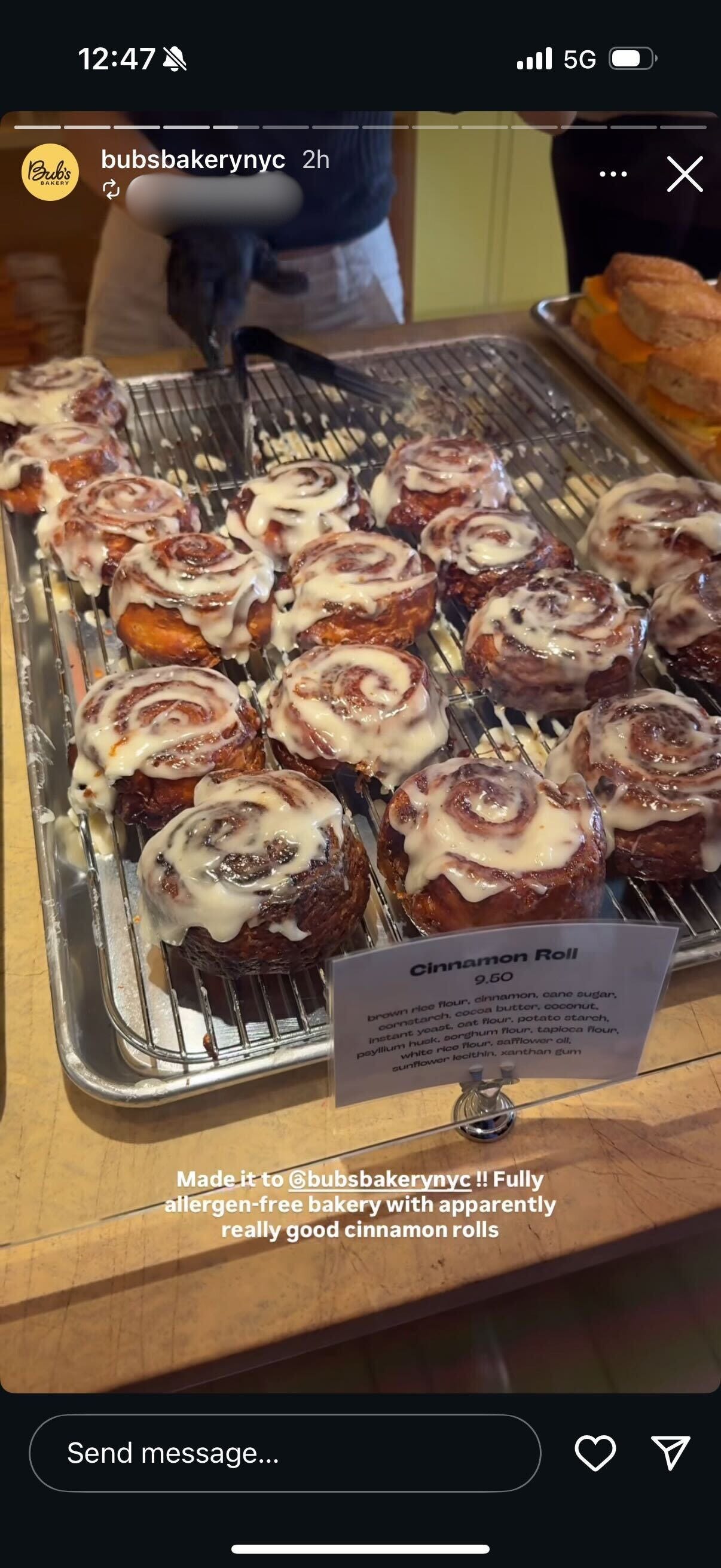
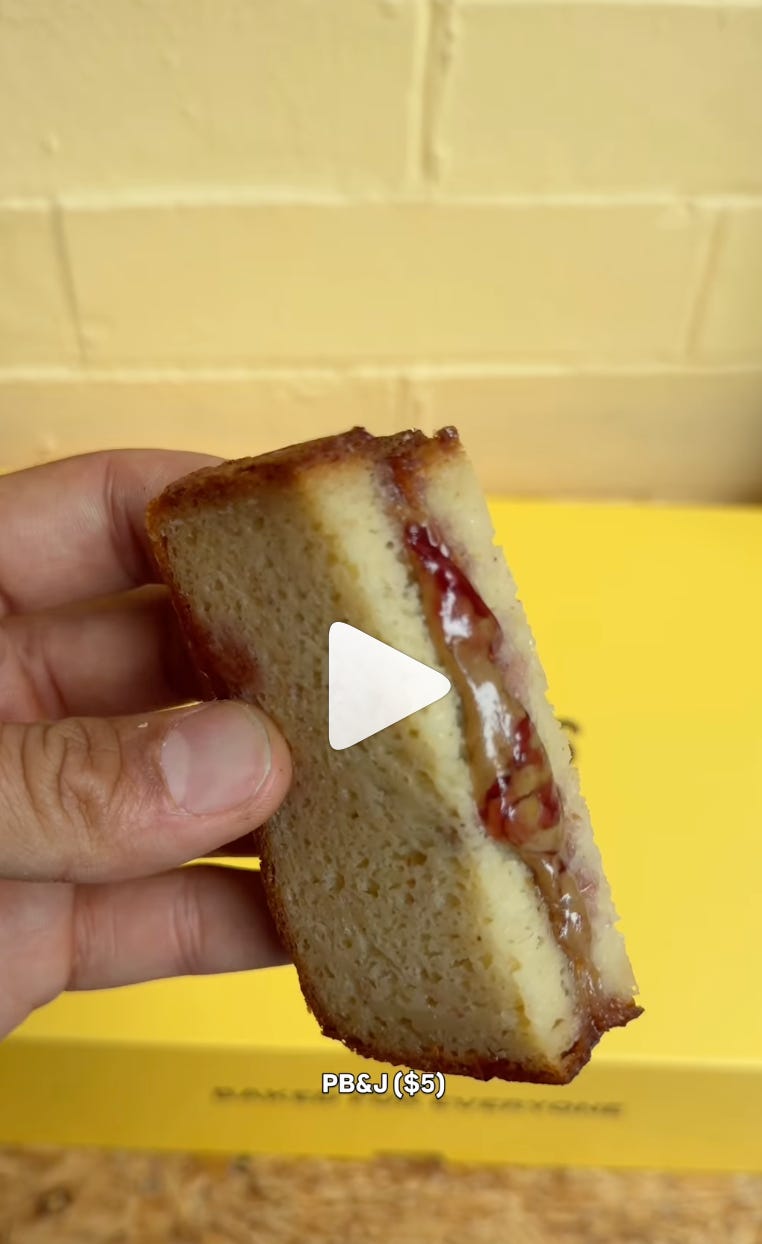
Christina, this article is so great!! After being at the FAACT Allergy Summit and learning about how dairy can also cause inhalant anaphylaxis this just blows my mind because what do you think happens when you steam the whole milk in the matcha and coffee. Thank you for drawing attention to this. I think businesses are using the uptick in allergies and celiac to make false claims that could really affect someone's health and they have no idea...
A few weeks ago, I went to lunch with a couple of good friends of mine who have food allergies and sensitivities. Each of them asked the waitress about suitable substitutions and possible cross-contaminations. The waitress was on point, able to answer almost every question competently, and whatever she didn't know, she made it a point to go back into the kitchen and find out. We had a delicious (and boring) meal as a result.
Keep in mind, this was at a Jewish deli on the outskirts of Philly -- and yet, this waitress went above and beyond to ensure my friends were able to enjoy their meals safely. I could tell it really meant a lot to them, especially since it could literally affect their health (and their lives).
if a business is being marketed as a haven for patrons with food allergies and sensitivities, they should be super transparent about their ingredients and methods from the start. Of course, many people (like my friends) will still do their due diligence for insurance, especially to find the truth beyond the glossy influencer sheen when such places blow up and become viral.
Good stuff -- thank you for sharing.